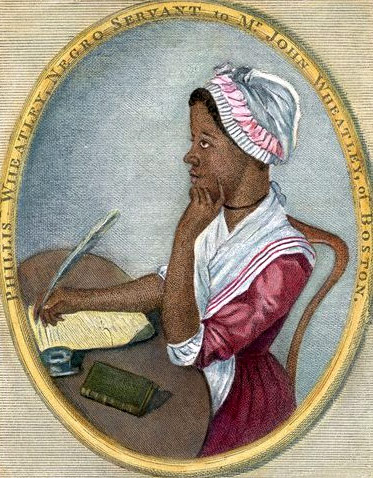
Online Texts for Craig White's Literature Courses
-
Not a critical or scholarly text but a reading text for a seminar
-
Changes may include paragraph divisions, highlights, spelling updates, bracketed annotations, & elisions (marked by ellipses . . . )
|
Poems of Phillis Wheatley (1753-84)
On Imagination |
|
Background: Imagination is a key feature of Romantic thought. Synonyms include "fancy" (comparable to "fantasy"). Contrast Age of Reason.
Discussion questions:
1. Wheatley's career during the 1700s is mostly associated with the USA's founding during the Enlightenment or Age of Reason, but what about this poem anticipates the Romantic era of the late 1700s-early 1800s?
2. How is "imagination" Romantic and not "Age of Reason?"
3. How does Wheatley personify imagination? How are these images or metaphors Romantic?
4. What about the language and imagery generally matches up with Romantic poetry? (see Romantic rhetoric)
5. Are Wheatley's references to classical myths or spirits Romantic or Enlightenment / Age of Reason? How both or either?
![]()
On Imagination
Thy various works, imperial queen, we see,
[queen = Imagination personified]
How bright their forms! how decked with pomp by thee!
[pomp = splendid show or display]
Thy wond'rous acts in beauteous order stand,
And all attest how potent is thine hand.
4
From Helicon's refulgent heights attend, [Greek
mountain sacred to poetic muses]
Ye sacred choir, and my attempts befriend:
To tell her glories with a faithful tongue,
Ye blooming graces, triumph in my song.
8
Now here, now there, the roving
Fancy flies,
[fancy = synonym of imagination or fantasy]
Till some loved object strikes her wandering eyes,
Whose silken fetters all the senses bind,
[fetters = restraints, shackles]
And soft captivity involves the mind.
12
Imagination! who can sing thy force?
Or who describe the swiftness of thy course?
Soaring through air to find the bright abode,
Th' empyreal palace of the thund'ring God,
[empyreal = imperial + empyrean or heavenly?] 16
We on thy pinions can surpass the wind,
[pinions = wings]
And leave the rolling universe behind:
From star to star the mental optics rove,
[recall Enlightenment fascination with astronomy]
Measure the skies, and range the realms above.
20
There in one view we grasp the mighty whole,
Or with new worlds amaze th' unbounded soul.
Though Winter frowns to
Fancy's raptured
eyes [raptured = ecstatic, transfixed]
The fields may flourish, and gay scenes arise;
24
The frozen deeps may break their iron bands,
And bid their waters murmur o'er the sands.
Fair Flora may resume her fragrant reign,
[goddess of flowers]
And with her flowery riches deck the plain;
28
Sylvanus may diffuse his honours round,
[god of spring]
And all the forest may with leaves be crowned:
Showers may descend, and dews their gems disclose,
[gems = buds, blossoms]
And nectar sparkle on the blooming rose.
32
Such is thy power, nor are thine orders vain,
[thy, thine = imagination's]
O thou the leader of the mental train:
[= thought-association]
In full perfection all thy works are wrought,
[wrought = made]
And thine the sceptre o'er the realms of thought.
[sceptre = symbol of rule, authority]
36
Before thy throne the subject-passions bow,
Of subject-passions sovereign ruler thou;
At thy command joy rushes on the heart,
And through the glowing veins the spirits dart.
40
Fancy might now her silken pinions try
[pinions = wings]
To rise from earth, and sweep th' expanse on high:
From Tithon's bed now might
Aurora rise,
[Aurora = goddess of dawn; Tithon = her lover]
Her cheeks all glowing with celestial dyes,
[= heavenly colors]
44
While a pure stream of light overflows the skies.
The monarch of the day I might behold,
[monarch of day = the sun]
And all the mountains tipt with radiant gold,
[tipt = tipped]
But I reluctant leave the pleasing views,
48
Which Fancy dresses to delight the
Muse;
[Muse = inspirations of poetic voice]
Winter austere forbids me to aspire,
And northern tempests damp the rising fire;
They chill the tides of Fancy's flowing sea,
52
Cease then, my song, cease the unequal lay.
[lay = lyrical song; unequal = not matching the subject]

"If Wheatley does not satisfy those who wonder at her
seeming obliviousness to the condition of the vast dark body, seven hundred
thousand strong, held slaves in perpetuity, perhaps it is because those
commentators have failed to survey the poet’s life, work, and society as
complex, interrelated phenomena. The most just assessment seems to be that
Wheatley’s career ranks with the best that early America has to offer.
